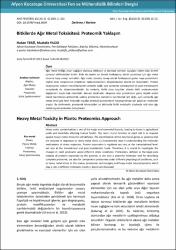| dc.contributor.author | Terzi, Hakan | |
| dc.contributor.author | Yıldız, Mustafa | |
| dc.date | 2014-11-24 | |
| dc.date.accessioned | 2014-11-24T07:11:36Z | |
| dc.date.available | 2014-11-24T07:11:36Z | |
| dc.date.issued | 2013 | |
| dc.identifier.issn | 2147-5296 | |
| dc.identifier.uri | http://hdl.handle.net/11630/890 | |
| dc.description.abstract | Ağır metal kirliliği, insan sağlığını olumsuz etkileyen ve tarımsal verimde kayıplara neden olan önemli
çevresel tehlikelerden biridir. Bitki hücresinin en önemli fonksiyonu, kendi savunması için ağır metal
stresine karşı cevap vermektir. Ağır metal stresine cevap olarak fonksiyonel genler veya proteinlerin
teşhisi stres cevaplarının moleküler mekanizmalarının anlaşılmasında önemli bir basamaktır. Protein
ekspresyonu sadece transkripsiyonel seviyede değil, aynı zamanda translasyonel ve post-translasyonel
seviyelerde de düzenlenmektedir. Bu nedenle, farklı stres koşulları altında bitki proteomundaki
değişimleri araştırmak önemlidir. Genom tarafından eksprese olan proteinlerin geniş ölçekli analizi
olarak tanımlanan proteomik, sadece proteomun tamamını tanımlamak için değil, aynı zamanda ağır
metal stresi gibi farklı fizyolojik koşullar altındaki proteomların karşılaştırılması için güçlü bir moleküler
araçtır. Bu derlemede, proteomik teknolojileri ve bitkilerde farklı metabolik olaylarda rolü olan ağır
metal teşvikli proteinler tartışılmıştır. | en_US |
| dc.description.abstract | Heavy metal contamination is one of the major environmental hazards, leading to losses in agricultural
yields and harmfully affecting human health. The most crucial function of plant cell is to respond
against heavy metal stress for self-defence. The identification of the functional genes or proteins that
are involved in responses to heavy-metal stress is a fundamental step in understanding the molecular
mechanisms of stress responses. Protein expression is regulated not only at the transcriptional level,
but also at the translational and post-translational levels. Therefore, it is crucial to investigate the
changes in plant proteome under different stress conditions. Proteomics, defined as the large-scale
analysis of proteins expressed by the genome, is not only a powerful molecular tool for describing
complete proteome, but also for comparative proteomes under different physiological conditions, such
as heavy metal stress. In this review, proteomics technologies, and heavy metal induced proteins which
play a role in different metabolic events in plants are discussed. | en_US |
| dc.language.iso | tur | en_US |
| dc.publisher | Afyon Kocatepe Üniversitesi | en_US |
| dc.identifier.doi | 10.5578/fmbd.6059 | en_US |
| dc.rights | info:eu-repo/semantics/openAccess | en_US |
| dc.subject | Bitkiler | en_US |
| dc.subject | Ağır Metal | en_US |
| dc.subject | Toksisite | en_US |
| dc.subject | Proteomik | en_US |
| dc.subject | Kütle Spektrometrisi | en_US |
| dc.title | Bitkilerde Ağır Metal Toksisitesi: Proteomik Yaklaşım | en_US |
| dc.title.alternative | Heavy Metal Toxicity in Plants: Proteomics Approach | en_US |
| dc.type | article | en_US |
| dc.relation.journal | Fen Bilimleri Dergisi | en_US |
| dc.department | Afyon Kocatepe Üniversitesi, Fen Edebiyat Fakültesi, Biyoloji Bölümü | en_US |
| dc.identifier.volume | 13 | en_US |
| dc.identifier.startpage | 1 | en_US |
| dc.identifier.endpage | 21 | en_US |
| dc.identifier.issue | 2 | en_US |
| dc.relation.publicationcategory | Makale - Ulusal Hakemli Dergi - Kurum Yayını | en_US |



















